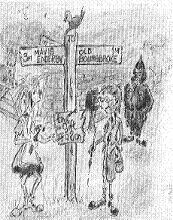I’m pleased to report that last year’s song thrush is back. At least he looks similar. I also saw a heron the other day, and a pied wagtail. (I was with someone who knows about these things).
* * *
Morning
553 for 5. That’s how it ended last night. Not bad at all.
A day of records – only the second time four England players have scored a century in one innings, and Prior the first England wicket-keeper to score one on debut.
Pity we couldn’t have had a bowl at them before stumps, but as someone said, get the runs now, while it’s easier than it will be on the last day. And it might be best to grind them into the dust until, say, lunch today and take away all hope.
I’ve read the West Indies’ attack described as being less than world standard. But they’re not Zimbabwe. This is not going to be a pushover.
I hear there’s a football match going on at the same time today.
Later
I said the Windies would give us a run for our money. Beautiful aggressive batting from Ramdin and Bravo, showing others how to deal with Panesar, who himself demonstrated the nerve, not to mention stamina, needed by a spin bowler. Great bat-bowl contest.
Prior showed that he’s a pretty competent keeper. A pity that he had had to show it by reducing the runs Steve Harmison would otherwise have given away in wides. And it's worrying about Hoggard. I hear he missed the birth of his son in order to play for England. That's the kind of man we need in the team.
It’s shaping up nicely, as they say in tabloid-land.
* * *
And now, with acknowledgements and apologies to Stanley Holloway, Marriot Edgar and the PC police, here’s a monologue based on an incident I’m told is true.
‘T’were a few year ago, one September,
In this tale that I’m going to relate,
When t’king of some African country
Came to London on visit o’ state.
He were due to 'ave dinner with H.M. the Queen
Which didn’t quite please the old dear.
‘I’ll bet the blighter eats peas off his knife
and doesn’t drink nowt but beer.’
The Prime Minister told her, all smarmy-like,
‘Don’t fret thi'sen, ma’am, said he.
‘For after he’d finished at spear-throwing school,
He studied at L.S.E.’
Besides, said PM, all ‘aughty and grand,
In ‘is white tie and tails and ‘is topper.
The ‘ole thing’s in aid of good will and peace.
And we're after ‘is diamonds and copper.
All right, said Queen, but gave him the look
That folk get when they’re sent to the Tower,
‘For England, our realm, we will do this deed,
But the man’s still an absolute shower.’
His Majesty brought dozen wives with ‘im,
Just enough, but not the ‘ole set.
They came in the baggage compartment
Of an 'Elephant Air' jumbo jet.
He were just a bit peeved by the Customs -
Kept waiting he were for a while -
As they checked out his sackfuls of ganja
And examined his pet crocodile.
They ‘ung onto his assegai, then let ‘im go,
To be greeted by Prince Phil and Queen.
The pageant and pomp and the circumstance
Were grandest old lad had yet seen.
Guardsmen marched by wearing busby ‘ats;
There were flags of bright red, white and blue;
There was biltong, and bush tea, and coconuts.
Aye, an’ old ale and sandwiches too.
The Queen gave king a couple of jars
Of honey from Prince of Wales’ hives
The queen got some cheese made from lioness milk
And Philip got one of the wives.
The Queen took king on to Buckingham House
In a carriage all way up the Mall.
Crowds, they were deep, and folk cheered like mad
They tret lad just like an old pal.
He waved to the crowds, all the way, did king,
With a big grin that showed he were pleased,
While Philip were whispering in new wife’s ear
And queen were nibbling on t’cheese
Four milky white horses, all thoroughbreds,
Were pulling the plush regal cart,
When a silly old mare at back let go
Wi’ a right royal, thunderous fart.
An un’oly ‘ush settled down on the crowd.
T’king were too non-plussed to speak,
And when t’orse repeated her lez-majesty
Prince Phil started swearing in Greek.
But Queen, dear old soul, is allus cool.
She ‘andles such gaffes wi’ great skill.
Australians, Frenchmen and Flatulence -
Such things are mere grist to ‘er mill.
So with lady-like handkerchief over her nose,
She said, ‘What a nasty mishap.
We are sorry, Your Majesty, that this transpired.
O do please forgive us, old chap.’
‘Indeed, lass,' said king, all gentleman-like,
'Forgive thee I will, but of course.
Though between me and thee, if I may speak so free
I thought at the time it were ’orse.’





